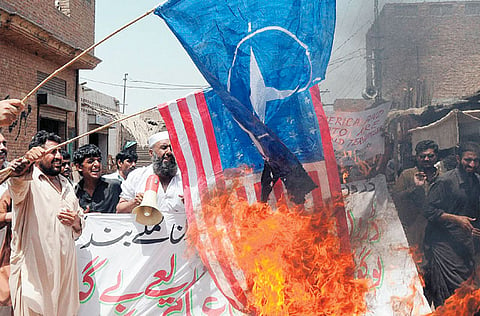Pakistan faces dilemmas over route closure
Attacks could force Pakistan to open road to Karachi

Karachi Strings of drone attacks on Pakistan’s restive north could scale up pressure in the country to open up its ports and roads for supplies to the landlocked Afghanistan where Nato forces are at war with the Taliban and Al Qaida.
The drones almost came to a halt about six months ago after American attacks on a Pakistani military post at Salala, near the Afghanistan border, which almost broke up its ten-year-old alliance with the United States in its war on terror.
The US attack killed at least 27 of Pakistan’s soldiers and officers creating widespread resentment among the people and mounting pressure on the ruling Pakistan People’s Party government to severe ties with the US.
Instead, Pakistan blocked the shipment of Nato forces at its Karachi Port in an attempt to force the Americans to apologise over the incident of Salala.
However, the drone attacks increased in the aftermath of Nato’s Chicago summit where the world believed that Pakistan would concede to demands to re-open the supply routes. Contrary to popular belief, the Pakistani government did not.
“It was a general understanding that the Pakistani government would allow Nato supplies after the Chicago summit,” said Jaffar Ahmad, a professor of Pakistan Studies at Karachi University.
“The fresh drone attacks seem to be pressure tactics of the US to get Pakistan to open its routes for the Nato supplies,” Ahmad said.
Since late May eight drone attacks have been carried out and the deadliest was on Monday in which 18 militants were killed in North Wazirstan.
Analysts believe Pakistan’s demand for an American apology is irrational during an election-year in the US and it will have to compromise on its demand.
Complex dilemma
“How can you expect Obama to offer an apology to Pakistan when he is contesting the election for a second term in the office,” remarked Ahmad, who heads the Pakistan Study Centre at the university.
Facing complex dilemmas, the Pakistani government has also been under pressure from opposition parties in the parliament as well as the public.
Early this year Pakistan’s radical and Islamist party formed an alliance in the name of Pakistan Defence Council led by proscribed Jamatud Dawa along with Jamate Islami and others. The alliance is believed to have been formed by the establishment to pressurise the government into resuming the Nato supplies.
“The establishment and the government got the domestic pressure built so high it is difficult for them to defuse the situation,” observed professor Hassan Askari, a prominent political analyst and columnist.
Beside the domestic opposition, Pakistan has also been missing its monetary expectation from the US for allowing the Nato supplies. The country has reportedly demanded $5,000 (Dh18,300) for handling a shipping container, which, some believe, is an exaggerated price.
The fair rate is stated to be $1,500 to $2,000 a container, which the US might agree to pay.
“Americans need to withdraw from Afghanistan as per their schedule and thus need re-opening of the supplies to execute its plans accordingly,” Askari said.
“On the other side Pakistan has been in need of money badly to fund its huge financial deficits,” he said.
The Pakistan government announced its annual budget last week showing a Rs1.2 trillion deficit that accounts for 4.7 per cent of its gross domestic products (GDP).
‘Revenge attacks’
The cash-starved country is weighing an option to approach the International Monetary Fund (IMF) seeking $4 to $5 billion dollars to meet its current account deficits.
The drone strikes might also affect the general security of Pakistan as furious militants could lash out through suicide or other attacks.
“It is very much possible and feared that the rising drone attacks might result in revenge attacks in other parts of Pakistan by the militants,” said Assad Dotani, a local resident of North Waziristan and a social worker.
On the diplomatic side, analysts believe Pakistan would have to take early decisions to salvage its isolation in global politics and ensure its role in the region.
“If they do not open the transit supplies of Nato, Pakistan would stand isolated internationally and its role in Afghanistan would be limited,” Askari said.


